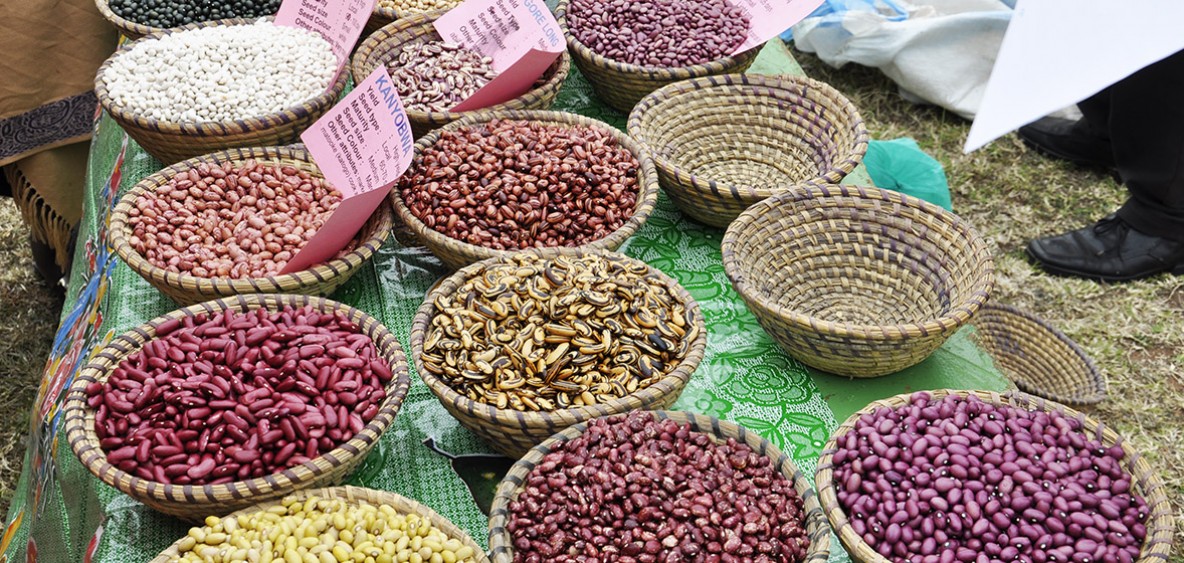
FAO has partnered with Bioversity International to conduct training in Burundi’s highlands on assessing and conserving agrobiodiversity in order to build the resilience of smallholder food systems to climate change and climate variability.
Increasing the resilience of local food systems through better use and conservation of agrobiodiversity is key to food security. According to FAO, agrobiodiversity refers to the variety of plants, animals, and micro-organisms that are present within a food system, including genetic varieties (seeds, breeds) and the diversity of non-harvested species (soil micro-organisms, pollinators, insects) that support food production.
In sub-Saharan Africa, traditional mixed farming methods have been largely replaced with modern monoculture farming systems with farmers growing fewer and fewer crops. This transition is largely due to increasing food demands for Africa’s rapidly growing population, leading governments to promote the intensified production of staple food crops through subsidies and incentive schemes. As commercial and smallholder farmers move further away from more traditional farming systems and intensify unsustainable farming practices, natural resources become degraded, ecosystem services decline, and agrobiodiversity suffers.
Ongoing loss of agrobiodiversity leads to higher vulnerability of farming systems to the impacts of climate change and decreases resilience to pests and diseases, both of which lower agricultural productivity.
In response to the threat that the loss of agrobiodiversity poses to food and nutrition security, the RFS Burundi project has made the diversification of food production systems a priority. The project is working to help smallholder farmers improve soil health, diversify production systems, strengthen community management of seed, and increase access to seed diversity.
FAO, the lead implementer of the RFS Burundi project, partnered with Bioversity International, a Regional Hub partner, to conduct training on assessing levels of agrobiodiversity and identifying constraints and opportunities within the current system for biodiversity conservation. The aim of the training was to equip participants with knowledge and practical experience in how to collect sound data using participatory diagnostics, as well as how to establish and manage community seedbanks. The training used participatory diagnostic techniques developed under Bioversity International’s Diversity Assessment Tool for Agrobiodiversity and Resilience (DATAR).
DATAR is a decision-making tool created to help project beneficiaries assess diversity and design interventions that promote crop, livestock, and aquatic genetic diversity. Participants of the training gained hands-on experience in using the different methods to identify and characterise local crop varieties and breeds, and to identify ways to improve access, selection, and sharing of crop and animal genetic diversity at the community and national levels. The RFS Burundi project team also provided training on the concept of community seed-banking—a key strategy both for conserving seed diversity and increasing access to high quality seeds.
The training was successful in building awareness surrounding the importance of conserving and promoting agrobiodiversity. It also highlighted concerns around the loss of local maize varieties as farmers are increasingly pressured to adopt expensive hybrid maize seeds. In the country’s highlands, where the impacts of climate change increasingly threaten ecosystem health and food production, promoting the use of local seed varieties will help to reverse this trend and build resilience within Burundi’s food systems.
Subscribe to our monthly newsletter to receive updates on stories directly from the field across all our projects, upcoming events, new resources, and more.